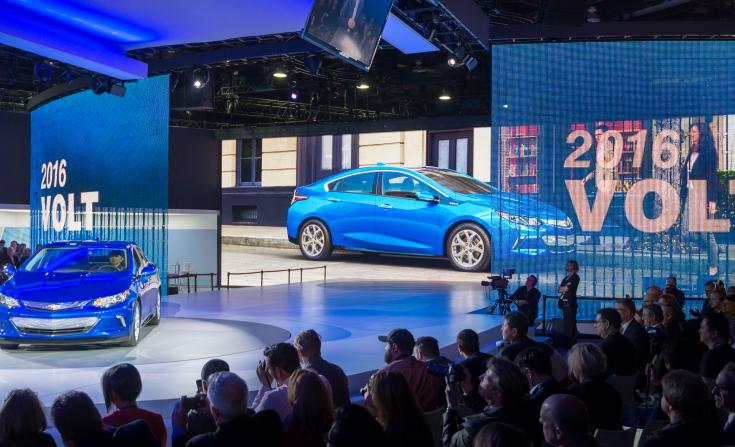 |
| Reviews and Templates for Expression We |
Apple, GM, Google and the $140 billion pledge to combat climate change
In preparation of COP21, officials from 13 of America’s largest companies including Apple, Walmart, and Goldman Sachs gathered with Secretary of State John Kerry at the White House on Monday to announce a $140 billion pledge in low-carbon investments.
The announcement is a part of the Obama Administration’s American Business Act on Climate Pledge, which looks to partner with the private sector to reduce carbon emissions and meet its previously stated goal of reducing greenhouse gas emissions throughout the United States by 26-28 percent in 2025.
In addition to the $140 billion pledge in low carbon investments, the 13 companies announced that their investment will also include a commitment to 1,600 megawatts in new renewable energy.
“These are executives who saying that climate change is already costing us too much. And the longer we delay action the higher the price tag grows,” said Bob Deans Director of Strategic Engagement at the National Resources Defense Council (NRDC).
The companies participating in the Climate Pledge across a variety of different industries, and along with Goldman Sachs, Walmart and Apple, include PepsiCo, Bank of America, Google, General Motors, steel supplier Alcoa, Coca-Cola, Cargill, UPS, Microsoft and Berkshire Hathaway Energy.
Combined, the 13 companies' yearly revenues total $1.3 trillion*; however, each company’s commitments to reduce carbon emissions differ.
Cargill's Vice President of corporate affairs, Mike Fernandez, added, "With our unique position in agricultural supply chains, it is important for Cargill to participate in the conversation about the needed response to climate change. This is for us not just about doing the right thing, it is about doing the smart thing for our customers."
These commitments include Alcoa’s pledge to reduce GHG emissions by 50 percent in 2025, as well as Bank of America’s pledge to increase their “environmental business initiative”, which includes lending, financing and advisory services from $50 billion to $125 billion by 2025.
“These are not companies that would make decisions lightly. I think it sends a signal to other companies,” said Anne Kelly, a Senior Program Director at sustainability NGO Ceres.
Leading up to Paris
The companies’ combined pledges come before the United Nations Climate Change Conference, which is being held in Paris in December as countries world look to hold the world’s temperature from rising above 2 degrees Celsius and mitigate the ravishing effects of climate change.
Last September at the UN Climate Summit in New York, President Obama stated, “There’s one issue that will define the contours of this century more dramatically than any other, and that is the urgent and growing threat of a changing climate.”
As COP21 approaches, the Climate Pledge also highlights the role that businesses and companies will play in Paris, and the role that they play in reducing GHG emissions given that there is little regulation requiring them to do so.
“We have to have very strong U.S. ambition going into Paris,” said Kelly. “These are all U.S. companies and it’s really important that the U.S. negotiating team has the economic cover to go and push for a strong deal.”
The Climate Pledge also looks beyond reducing carbon emissions as companies pledge to reduce water and waste as well as increase investment in renewables.
In the press release, Google announced that it would reduce water usage by 30 percent reduction in their Bay Area headquarters by the end of the year. General Motors plans to reduce waste by 40 percent in 2020 using 2010 as a baseline.
The emphasis and commitment to renewable energy also puts the spotlight on energy companies as no energy company participated in the Climate Pledge.
So far no US oil and gas company has asked for a carbon price, while six European oil and energy company executives — BP, BG, Shell, Statoil, Italian oil company Eni and French oil company Total — have advocated for implementing a price on carbon in a recent letter to the UN.
The commitment to renewables might also be a sign of things to come as the price of crude oil fell to under $50 a barrel this week and dropped to a four month low. And according to Bloomberg News, “oil supply has exceeded demand for the past five quarters.”
“I think they are sending a very strong signal and are creating demand for renewable energy procurement,” said Kelly.
Bob Deans adds, “These companies also understand that the real jobs, the real growth, the real prosperity in the future are going to come from shifting away from dirty fossil fuels of the past and clean energy solutions of the future.”
*Correction: A previous version of this story misstated the combined revenues of the companies involved in the new climate pledge.
|
|
|
|
Copyright 2011 Energy and Technical Services Ltd. All Rights Reserved. Energyts.com |
